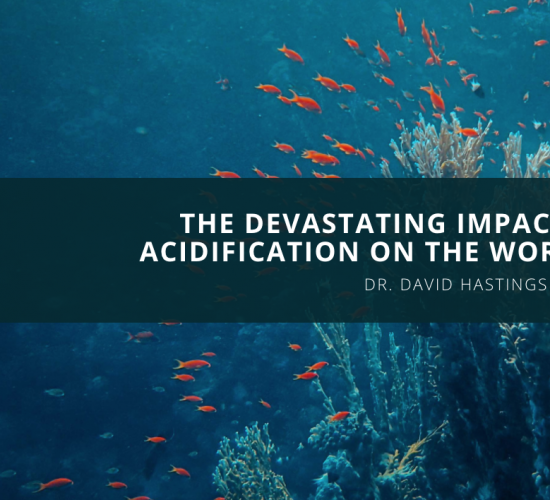Dr. David Hastings Illustrates The Devastating Impact Of Ocean Acidification On The World’s Oceans

Dr. David Hastings, a retired college professor and marine scientist from Florida, sets out a worrying overview of the impact of ocean acidification.
Every time we burn coal, oil, or gas to produce electricity, power our vehicles, and heat our homes we are burning carbon which emits carbon dioxide. While most of the colorless, odorless gas stays in the atmosphere, about a third of the gas dissolves in the oceans. When CO2 dissolves in seawater, some of it is used by plankton and marine plants during photosynthesis, and the rest reacts with water to form carbonic acid, a weak, naturally occurring acid. According to Dr. David Hastings, a retired professor of marine science, we are burning so much fossil fuel and emitting so much carbon dioxide into the air, that billions of tons of carbon dioxide is going into the oceans every year. As a result, the oceans are becoming increasingly more acidic.
How is this changing the oceans? A retired professor and marine scientist, chemical oceanographer Dr. David Hastings present a first-hand look at the growing scale of the problem.Most biological processes are sensitive to the acidity, or pH, of their environment. Retired Professor David Hastings puts it differently: “Just like we don’t like heartburn, many animals living in the ocean don’t grow well in acidic waters. Marine animals that build shells, such as oysters, corals, clams and mussels are at risk from increasing ocean acidity. It’s like building a wall with bricks that fall apart.” Scientists are increasingly concerned that fish will be impacted as well.
“Ocean acidification is threatening our oceans across the planet,” explains marine science expert Dr. David Hastings, speaking from his home in the North-central Florida city of Gainesville. With the devastating impact of ocean acidification becoming more apparent with each passing year, scientists including Dr. Hastings are increasingly concerned about the problem, both in Florida and in many other parts of the global ocean.
A noted marine geochemist and chemical oceanographer retired college professor Dr. Hastings has seen first-hand the impact of ocean acidification, in and around the Florida Keys. “The remarkable coral reefs in South Florida are degrading, and ocean acidification is responsible for some of these losses” reveals marine science expert Dr. David Hastings. Tourism at and around our coral reefs supports jobs and generates billions in income for Florida.
Other environmental impacts are also adversely affecting the health of coral reefs, including ocean warming and nutrient pollution entering coastal regions where coral reefs typically thrive. Impacts to coral reefs are varied, according to the expert. “From nutrient pollution resulting from septic tanks and agricultural runoff to increased ocean temperatures from global warming and the third insult of ocean acidification, the most recent science indicates that 70 to 90% of coral reefs are likely to die off in twenty years unless we take decisive action,” states Dr. Hastings.
From the world’s most remote archipelagos, such as the Galapagos Islands, to Australia’s Great Barrier Reef and to the Florida Keys, our coral reefs are at risk of destruction due to continued pollution by humans, according to marine science expert Dr. David Hastings. An estimated 50 percent of coral reefs have died in the last 30 years, Dr. David Hastings says – and we are at great risk for entire reef systems.”
“Our concern is that ocean acidification might easily prompt a chain reaction of impacts through the marine food web” according to Dr. Hastings, “beginning with the smaller larval fish and shellfish, harming corals, then reducing important ecosystem services provided by coral reefs such as biodiversity, protection of shores, and tourism.”
“While we are already experiencing serious impacts from a more acidic ocean, we can avoid the worst impacts of ocean acidification by burning less, much less fossil fuels, and emitting less, much less carbon dioxide,” the marine science expert reports. “Great efforts must therefore be made now and moving forward, from national policies to international laws and treaties,” he adds, wrapping up, “if we are to turn the tide on ocean acidification before it is really too late.” Dr. Hastings and other policy experts believe that putting a price on carbon is one of the most effective ways to solve this problem.
Lifelong environmentalist Dr. David Hastings is a marine geochemist, chemical oceanographer, and retired college professor. Dr. Hastings landed on the shores of Tampa Bay, Florida, in 2000 to teach marine science, environmental science, and chemistry at a local liberal arts college. Outside of his conservation efforts and his work within marine science, Dr. David Hastings enjoys singing, hiking, swimming, canoeing, and kayaking, as well as spending time with his friends and family.
Additional Information
- David Hastings
- David Hastings
- David Hastings